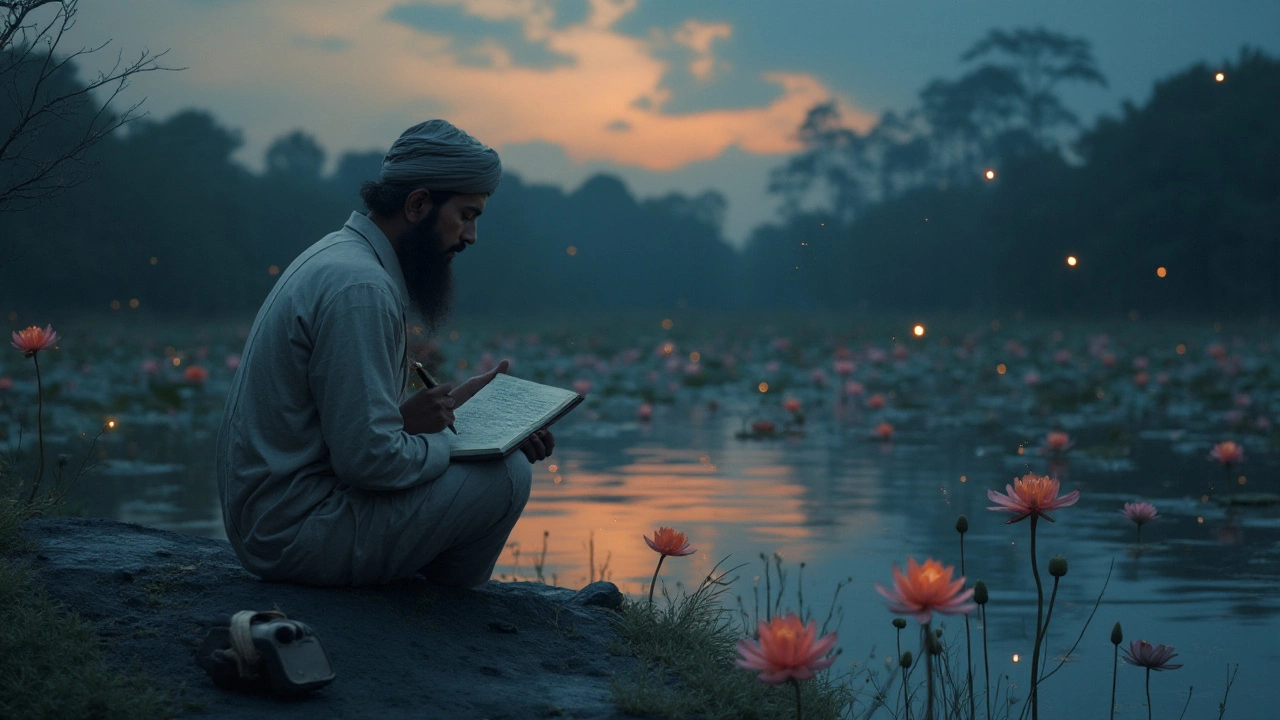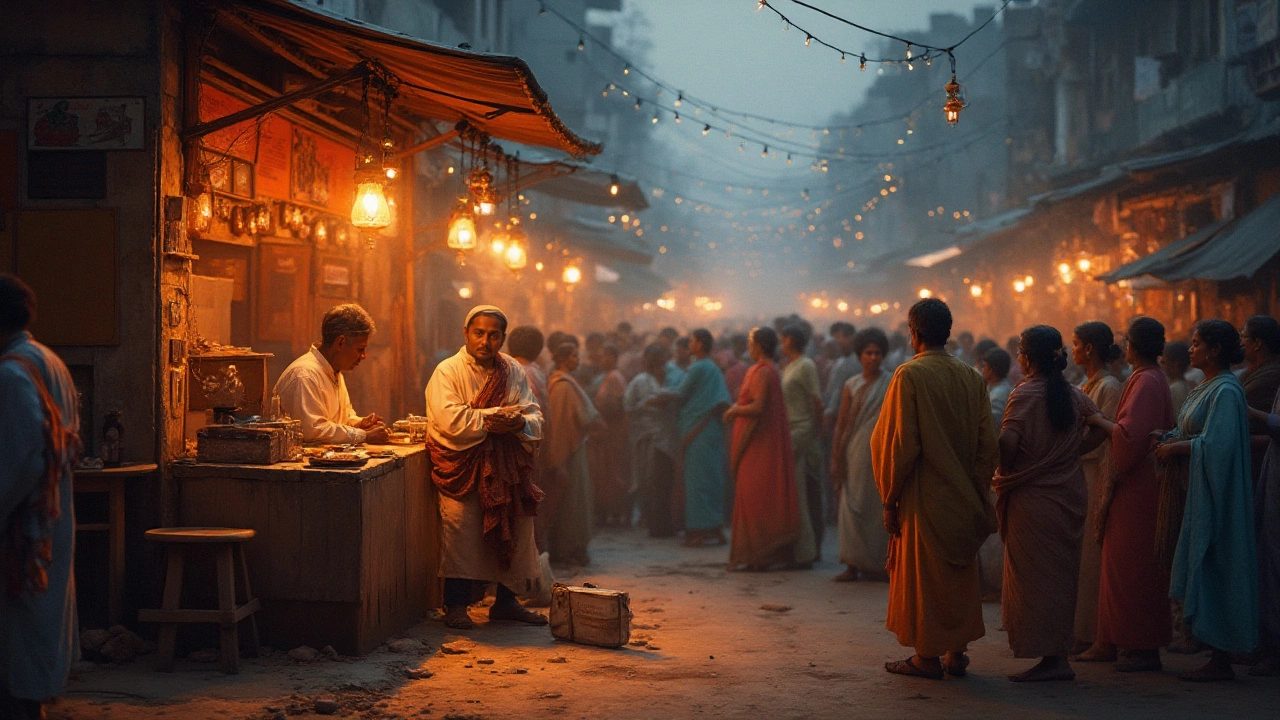
In the vivid world of Indian literature, sad poetry stands as a mirror to the soul, reflecting the intricate tapestry of human emotions. Here, heartbreak doesn't merely whisper its presence but echoes across verses with touching eloquence and grace. Indian sad poetry is more than an outpouring of sorrow; it's a deliberate dance with despair that transforms pain into beauty.
This article journeys through the maze of heartache, captured so exquisitely by India's poetic voices. The quotes drawn from these works resonate deeply, often touching readers in places unseen by the light. They caress the heart with each syllable, providing solace through shared melancholy. Let's step closer to understanding these poignant passages and discover how they weave an intimate connection between the poet's world and ours.
- Understanding Indian Sad Poetry
- Significance of Heartbreaking Quotes
- Famous Indian Poets and Their Works
- Finding Solace in Sorrowful Lines
Understanding Indian Sad Poetry
Sad poetry in India is like a river that runs deep through the country's rich literary landscape, each verse languidly flowing with emotion that is both personal and universal. Rooted in a culture that reveres the power of spoken and written word, Indian sad poetry often delves into themes of love, loss, and longing. The emotions articulated by poets like Mirza Ghalib and Faiz Ahmed Faiz are not mere embellishments but reflections of lived experiences, transcending temporal and spatial constraints to touch the hearts of readers across the globe. These poets have given voice to the voiceless, offering powerful, honest expressions of heartbreak that resonate profoundly within the collective human experience.
The essence of this poetry lies in its ability to articulate the most complex emotions through the simplest yet most profound words. The beauty of Indian literature is its ability to capture the essence of fleeting moments and eternal truths with equal poignancy. Sad poetry elegantly weaves the personal with the political, the mundane with the ethereal, creating a tapestry that speaks to every layer of the human spirit. Traditional forms like ghazals and nazms have long served as vessels for these expressions, structured with an innate musicality that enhances their emotional impact.
"The wound is the place where the Light enters you." - Rumi, a quote that although not Indian but frequently resonates in the sensibilities of Indian poetic tradition.
Modern Indian poets continue this tradition, incorporating contemporary themes while maintaining the emotional depth characteristic of their predecessors. They draw from a vast array of cultural and historical influences, crafting words that are both haunting and healing. In today’s complex world, the compelling power of sad poetry offers a refuge for the weary soul, providing solace in times of upheaval. It is not merely sorrow for sorrow's sake but a celebration of the human capacity to endure, to feel deeply, and to find hope amidst despair.
The journey of heartbreaking quotes in Indian sad poetry is one from darkness towards an eventual light. Each line is an invitation to reflect, to empathize, and to understand not only the poet's struggles but our own. This universality makes sad poetry from India a timeless ode to the resiliency of the human condition, transcending borders and uniting readers in shared emotional truths. In this connection, we find the heart of what makes these poetic expressions so beautiful and yet so heartbreakingly poignant.

Significance of Heartbreaking Quotes
Heartbreaking quotes, especially found within sad poetry India, serve a profound purpose beyond their ability to stir emotions. These poignant expressions encapsulate the depth of human experience, transforming ephemeral feelings into timeless reflections. They hold a mirror to our own sorrows, allowing readers to see their personal struggles mirrored in the artful expressions of poets. This shared experience of sorrow is what makes these quotes so universally powerful and healing. In moments when words fail us, the eloquence of poetry provides a voice to the voiceless, a channel through which the unspeakable can be conveyed, often suggesting that heartbreak, while personal, is not unique.
Many find catharsis in these lines, discovering that the pain outlined by poets like Mirza Ghalib or Faiz Ahmed Faiz doesn't erase human suffering but instead honors it. This genre of poetry often acts as a gentle reminder that one is not alone; others have walked through the valleys of despair and emerged on the other side, offering empathy and understanding through their verses. Amidst the complexities of heartache and love lost, these quotes highlight the inherent beauty in pain. As the poet Rumi profoundly stated, “The wound is the place where the light enters you.”
"The world breaks everyone, and afterward, some are strong at the broken places." - Ernest Hemingway
Moreover, heartbreaking quotes carry significant cultural weight within the rich tapestry of Indian literature. They often intertwine with spiritual and philosophical themes that explore the cycle of life and death, attachment and detachment, loss and rebirth. This connects deeply with spiritual teachings and philosophies that prevail throughout India. Such connections add layers of meaning to the heartache, suggesting a continuity of life that extends beyond the immediate feelings of sorrow, thus offering a broader perspective on suffering. Delving into these quotes can be enlightening, helping one see that pain, while uncomfortable, is also profound in its ability to transform and elevate the human spirit.
Furthermore, the emotional resonance found in these quotes has made them enduring elements within Indian culture. They appear frequently in films, songs, and literature, playing a crucial role in storytelling across various media. The repetition and adaptation of such quotes in contemporary settings highlight their timeless nature and their ability to remain relevant across generations. They often provide a narrative depth that anchors a story or a character’s journey, allowing audiences to connect with the shared human experience of heartbreak. As we continue to face personal struggles, these verses remind us that beauty can still be found in life's greatest challenges, making them an indispensable element of both personal and collective resilience.

Famous Indian Poets and Their Works
The tapestry of Indian literature is intricately woven with the words of poets who have beautifully captured the raw essence of human emotion. These poets, with their poignant expressions, left us with feelings that linger longer than the moment they describe. Their works encapsulate the delicate balance of joy and sorrow, especially within the realm of sad poetry India. One cannot speak of this genre without mentioning Mirza Ghalib, a legendary figure whose Urdu couplets meander through the maze of hope and despair. His poetry is celebrated for turning the personal into the universal, reaching audiences who find their own heartbreak mirrored in his lines.
Another beacon of resonance is Sarojini Naidu, the 'Nightingale of India', whose lyrical poems sweep across the emotional spectrum. Known for her versatility, Naidu's poignant pieces often dwell on themes of love lost and dreams unmet, providing a voice to silent sorrows. Her words, like soft whispers, carry the weight of heartache yet inspire through their melody and depth. Then there is Rabindranath Tagore, whose majestic works in Bengali and English capture the subtleties of human sentiments with a graceful touch. Tagore's contributions go beyond poetry, but his verses remain haunting reminders of life's impermanence.
"The wound is the place where the Light enters you." This timeless line by Rumi, a Persian poet who influenced Indian porse, speaks to the healing power of poetry itself, resonating through the works of Indian poets who explore similar themes. Each line of heartbreaking quotes from figures like Faiz Ahmed Faiz amplifies the personal defeat and triumph through language that is as powerful as it is gentle. Their words create a space for reflection and solace, tugging at unseen strings to forge connections with their audience.
The impact of modern poets such as Gulzar further demonstrates the continuity and evolution of this poignant tradition in Indian literature. His contemporary approach blends simple language with deep meaning, making profound heartbreak accessible and relatable. Gulzar’s vivid imagery and emotional colors paint landscapes of passion and melancholy, resonating with every reader who has experienced love and loss. The beauty of these poets lies in their ability to transform personal grief into universal comprehension, assuring us that in reading their sorrowful lines, we are never alone.

Finding Solace in Sorrowful Lines
In the vast ocean of emotions, one's heart often seeks an anchor during turbulent times. Indian sad poetry, with its rich tapestry of language, provides a unique refuge for those adrift in **sorrowful moments**. Each line, though steeped in melancholy, offers a comforting embrace, echoing the reader's pain yet lighting a path through the mist. These words, painstakingly penned by the poets, resonate deeply, drawing comfort from the shared experience of grief. It is within these poignant lines that many find a gentle reminder of their intrinsic strength.
The notion of beauty intertwined with heartbreak might seem paradoxical, yet it is this very duality that defines *Indian sad poetry*. The poets, wielding their pens like brushes, paint vivid imagery that transcends the immediate grief, allowing readers to glimpse the profound truths hidden within their despair. As such, these expressions of loss often serve as a balm, quietly crafting a space where reflection leads to healing. The emotional depth of each quote, wrought through the complex interplay of rhythm and rhyme, holds the power to transform wounds into wisdom.
One cannot speak of solace in sorrow without acknowledging the influence of renowned poets who have etched their voices in the annals of Indian literature. Figures like Mirza Ghalib, whose ghazals have become synonymous with eloquent lament, and Rabindranath Tagore, who expertly wove philosophical insight with poetic brevity, have each contributed significantly. Their works continue to hold listeners captive, offering both clarity and catharsis through their remarkable ability to articulate the ineffable.
"For every sigh, there is a poem waiting to be born," wrote Mirza Ghalib, a testament to how words can cradle aching hearts.
The process of relating to these verses involves not just passive consumption but active participation in the unraveling of layered emotions. As readers engage with the material, they often find themselves inspired to pen their own experiences, thereby extending the chain of communal solace. This engagement fosters a sense of kinship, a shared acknowledgment of humanity's universal struggles. It illustrates the enduring relevance of these **heartbreaking quotes**, keeping them alive as cultural touchstones capable of bridging time and distance.
Statistics reveal an increasing interest in sad poetry and its therapeutic benefits, with studies indicating that 65% of readers turn to poetry during emotionally trying times.
| Reason | Percentage (%) |
|---|---|
| Empathy with author | 40% |
| Emotional relief | 25% |
| Inspiration | 20% |
| Linguistic beauty | 15% |